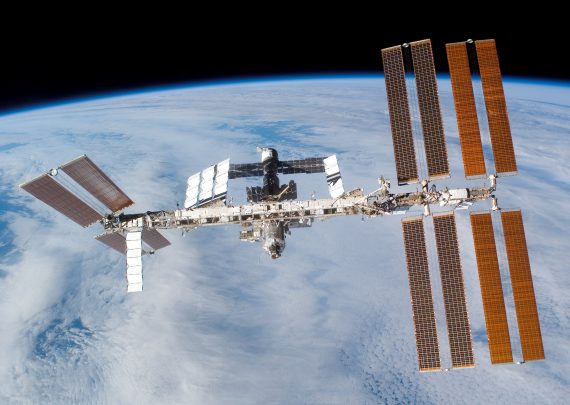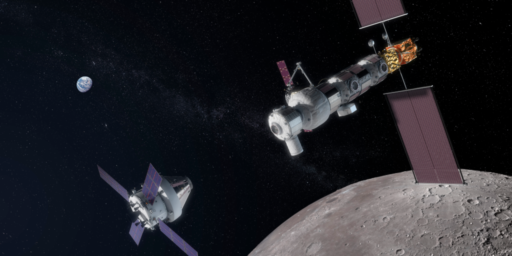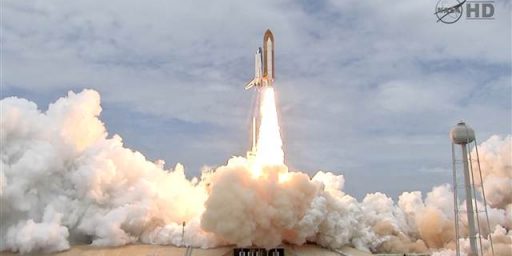The Space Program: A Bridge To Nowhere?
Gene Healy contends that the space program has been little more than a massive boondoggle of a government program:
Outside of avoiding the hypothetical horror of Martian gulags, what does the ordinary taxpayer get from the space program?
Not much, says Robin Hanson, a George Mason University economist and research associate at Oxford’s Future of Humanity Institute: The benefits are “mostly like the pyramids — national prestige and being part of history.”
Space partisans often point to the alleged technological breakthroughs that come from solving hard problems like keeping humans alive in an environment never meant to sustain them.
But, as Hanson points out, you could get similar technological boons from any ambitious project you convince the feds to spray money at — whether it’s robot butlers or floating cities. If we wanted to, we could surely “find other projects with larger direct payoffs.”
The argument for federally funded spaceflight ultimately boils down to “spacecraft as soulcraft,” the quasi-religious notion that, as Post columnist Charles Krauthammer puts it, we go “not for practicality,” but “for the wonder and the glory of it.”
Space must be an alluring muse indeed, given that it makes Krauthammer, normally a hardheaded neoconservative, sound like a yoga instructor gone lightheaded during a juice fast.
He calls space skeptics “Earth Firsters,” deaf to “the music of the spheres.” Apparently there’s nothing more “isolationist” than wanting to stay on your own planet.
Krauthammer’s obsession makes sense, in a way, since federally funded spaceflight is the quintessential neoconservative project: a giant, wasteful crusade designed to fill Americans’ supposedly empty lives with meaning.
Sorry, Charlie: The public’s not buying it. A 2010 Rasmussen poll showed that more Americans think private enterprise should pay for space exploration than think government should fund it.
By nearly 2-to-1 margins, they also oppose sending federally funded astronauts to the moon or Mars. As far as Americans are concerned, space is the ultimate “bridge to nowhere.”
While some would argue that you cannot measure the value of the space program based on return on investment alone, Healy does have a point here. As I noted yesterday, manned space flight for the past 30 years or so has been both uninspiring and not entirely worthwhile.
Does that make it a bridge to nowhere? I’m not sure, but quite honestly I don’t think it’s something worth spending money on just to boost national pride.







I’ve been critical of the big budget plans sold to congress (the Shuttle and if they had their way the Mars Mission), but there has been one huge, huge, success.
What they sometimes call “mission to planet earth,” with downward looking sensors have brought us tremendous knowledge, and of course a high-speed, global, information age.
It probably could have been done much cheaper, if the mission to planet earth had real congressional appeal.
(oh, add the International Space Station in as a money-getting ploy, rather than cost effective science.)
The article cited is incredible in how poorly informed it is. If you drive a car, use a phone, use a cellphone, use a computer, use a fax machine, have a “smart” thermostat in your home, use a refrigerator, use a stove, or watch television, you are making use of a direct outgrowth of the space program. The applications of the technology derived from the program are practically endless.
I think there’s a fair complaint about the post-Apollo space program. It has been productive but not nearly as productive as the early space program was. I don’t know whether that’s a case of low hanging fruit, that it has been oriented more to pure science, or that it was less ambitious.
We also have the ability to test the stated hypothesis, that any ambitious project would have had comparable results by comparing the results of the space program to that of medical research. We have spent an enormous amount on medical research over the last half century–much, much more than was spent on the space program. It has been productive but has it been as productive as the space program? I don’t think so.
The War on Poverty was certainly an ambitious project. Over the last half century we have spent trillions on it, significantly more than on the space program. Has it been as productive as the space program? Too many of the programs have been abject failures with little or nothing in the way of residuals.
What ambitious projects are they thinking of?
Less pure science, Dave. Bigger engineering is not good for science, it is too concentrated and too tilted toward construction.
(What I’m really connecting to is the more general criticism of Big Science. A supercollider may cost as much as 1000 small projects, but it has a funding advantage over the small projects separate from ROI. Big Science, like Big Space, sells on pride. Perversely the more expensive is more easily funded.
We got a space station, but not the cheaper and more vital solar observation sattilites.)
See the saga of the DSCOVER satellite.
I remember the pride and optimism that the space program gave to this country, especially in the ’60’s. The astronauts were real heroes; we could name them all. Today, our country lacks this type of feeling and strong nationalism. As far as cost, the space program is small compared to the money wasted on “foreign aid”, the welfare boondoggles, and government agencies such as the EPA and Education Dept. Those who criticize the space program as unneeded should keep this in mind; what other country has even attempted to land people on the moon?
“Ah, but a man’s reach should exceed his grasp,
Or what’s a heaven for?” — Robert Browning
“The Earth is the cradle of mankind, but one cannot remain in the cradle forever.” — Konstantin Tsiolkovsky
Also, see Heinlein’s essay, “Spin-Off,” reprinted in his “Expanded Universe” anthology.
J.
I was going to say, “great, then name just one!” But then Schuler knocked it out of the park.
And then there’s my point #2: at some point, we’re actually going to have to get off this planet if we are to survive. At least if we want billions of people to survive.
Curiously enough, one potential immediate benefit is the ability in a few decades to protect ourselves from a collision like the one that seemed to have wiped out the dinosaurs, and possibly a few other mass extinction events.
And of course all the other useful spin-offs from the program, like computers etc – though you could argue that they’ve been bad for the economy, as so many people are posting on internet forums instead of working.
Would anyone be surprised to learn that the NASA budget, from it’s inception, is less than we spent in one year in Iraq?